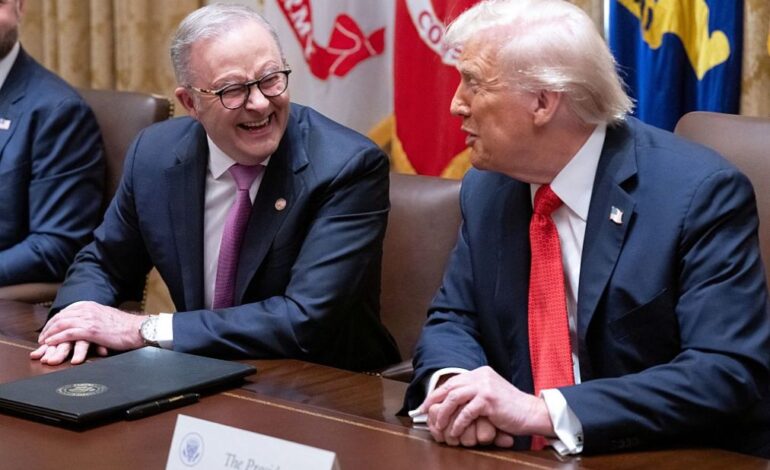Trump and Albanese Sign Minerals Deal to Counter China Influence

Australian Prime Minister Anthony Albanese met with President Donald Trump at the White House on March 15, 2024, to announce a significant minerals agreement aimed at enhancing cooperation between the United States and Australia. The deal focuses on facilitating access to Australia’s rare earth minerals, critical for advanced technologies, while also committing to expedite the production of nuclear-powered submarines under the AUKUS agreement.
During their meeting, the leaders signed a framework intended to bolster the supply of essential minerals for the U.S. market. This agreement is designed to accelerate permitting processes for mining and processing and to inject $1 billion in financing into relevant projects across both countries, as outlined by Albanese’s office. The Australian Prime Minister emphasized that this partnership would elevate the bilateral relationship, stating, “We are taking it to that next level.”
The White House provided additional details, revealing that the investment from both nations could reach $3 billion within the next six months. The U.S. Export-Import Bank is set to contribute $2.2 billion in financing to enhance critical minerals and supply chain security. Furthermore, the Pentagon plans to invest in a gallium refinery in Western Australia, underscoring the strategic importance of this mineral for advanced military applications.
With China’s growing influence in the Pacific as a backdrop, the discussions between Trump and Albanese also highlighted efforts to counter Beijing’s dominance in the global supply of raw materials. The minerals deal and the submarine agreement are expected to strengthen the allied naval presence in the region, reflecting a shared commitment to maintaining security.
Trump reassured Albanese that the U.S. would uphold its commitments under the AUKUS agreement, which includes the purchase of three Virginia-class nuclear-powered attack submarines. Asked about expediting the delivery of these vessels, Trump affirmed, “We are doing that, yeah. We have them moving very very quickly.”
The Secretary of the Navy, John Phelan, remarked that the AUKUS agreement is vital for the U.S. ability to project power in the Indo-Pacific, emphasizing the importance of clarity in the agreement moving forward.
As the U.S. and Australia solidify their partnership, Trump is preparing for discussions with China’s President Xi Jinping at the upcoming Asia-Pacific Economic Cooperation summit in South Korea. He indicated plans to impose tariffs on Chinese goods, potentially rising to 157% if economic concessions are not met. Trump stated, “If they don’t want to do business with us, China is in big trouble,” highlighting the ongoing tension in U.S.-China relations.
The meeting was not without its tensions, as Trump expressed his displeasure when reminded of past comments made by Australia’s current Ambassador to the U.S., former Prime Minister Kevin Rudd, who had criticized him. Rudd attempted to clarify that his comments were made prior to his ambassadorship. Trump responded, “I don’t like you either. And I probably never will,” showcasing the complex dynamics at play during the diplomatic engagement.
The agreements reached during this meeting are expected to have significant ramifications for both nations, particularly in the context of global supply chains and geopolitical stability. As the U.S. and Australia move forward, their collaboration aims to not only secure critical resources but also reinforce their strategic partnership in the face of growing challenges from China.






